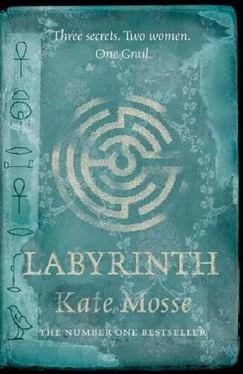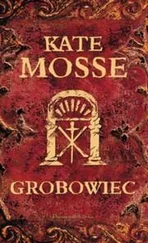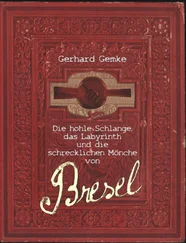“You have done everything you can, Messire. You must hold firm. You must finish this. The men grow restless.”
Trencavel glanced at the coat of arms above him, then back to Pelletier. For a moment, they held one another’s gaze.
“Inform Congost,” he said.
With a deep sigh of relief, Pelletier walked quickly to where the escrivan was sitting at his desk, massaging his stiff fingers. Congost’s head shot up, but he said nothing as he picked up his feather and sat poised to record the final decision of the Council.
For the last time, Raymond-Roger Trencavel rose to his feet.
“Before I announce my decision, I must thank you all. Lords of Carcasses, Razes, Albigeois and the dominions beyond. I salute your strength, your fortitude and your loyalty. We have talked for many hours and you have shown great patience and spirit. We have nothing to reproach ourselves with. We are the innocent victims of a war not of our making. Some of you will be disappointed at what I am about to say, others pleased. I pray that we will all find the courage, with God’s help and mercy, to stand together.”
He drew himself up. “For the good of us all-and for the safety of our people-I will seek an audience with my uncle and liege lord, Raymond, Count of Toulouse. We have no way of knowing what will come of this. It is not even certain my uncle will receive me and time is not on our side. It is therefore important that we keep our intentions hidden. Rumor spreads fast and if something of our purpose reaches the ears of my uncle, it might weaken our bargaining position. Accordingly, preparations for the tournament will continue as planned. My aim is to return well before the feast day, I hope with good news.” He paused. “It is my intention to leave tomorrow, at first light, taking with me only a small contingent of chevaliers and representatives, with your leave, from the great house of Cabaret, as well as Minerve, Foix, Qyillan…”
“You have my sword, Messire,” called one chevalier. “And mine,” cried another. One by one, men fell to their knees around the hall.
Smiling, Trencavel held up his hand.
“Your courage, your valor, honors us all,” he said. “My steward will inform those of you whose services are required. For now, my friends, I bid you grant me leave. I suggest you all return to your quarters to rest. We will meet at dinner.”
In the commotion that accompanied Viscount Trencavel’s departure from the Great Hall, nobody noticed a single figure in a long blue hooded cloak slide out of the shadows and slip away through the door.
The bell for Vespers had long since fallen silent by the time Pelletier finally emerged from the Tour Pinte.
Feeling every one of his fifty-two years, Pelletier lifted aside the curtain and walked back into the Great Hall. He rubbed his temples with tired hands, trying to ease the persistent, hammering ache in his head.
Viscount Trencavel had spent the time since the end of Council with the strongest of his allies, talking about how best to approach the count of Toulouse. Talking for hour upon hour. One by one, decisions had been taken and messengers had galloped out from the Chateau Comtal bearing letters not only to Raymond VI, but also to the papal legates, to the abbot of Citeaux and Trencavel’s consuls and viguiers in Beziers. The chevaliers who were to accompany the viscount had been informed. In the stables and the smithy, preparations were already in hand and would continue most of the night.
The chamber was filled with a hushed but expectant silence. Because of tomorrow’s early departure, instead of the planned banquet there was to be a more informal meal instead. Long trestle tables had been set out, unclothed, in rows running from north to south across the room. Candles flickered dimly in the center of each table. In the high wall sconces, the torches were already burning fiercely, setting the shadows dancing and flickering.
At the far end of the room, servants came in and out, carrying dishes that were more plentiful than ceremonial. Hart, venison, chicken drumsticks with capsicum, earthenware bowls filled with beans and sausage and freshly baked white bread, purple plums stewed in honey, rose-colored wine from the vineyards of the Corbieres and pitchers of ale for those with weaker heads.
Pelletier nodded his approval. He was pleased. In his absence, Francois had deputized well. Everything looked as it should and of a level of courtesy and hospitality Viscount Trencavel’s guests had the right to expect.
Francois was a good servant, despite his unfortunate start in life. His mother had been in the service of Pelletier’s French wife, Marguerite, and was hanged for a thief when Francois was no more than a boy. His father was unknown. When his wife had died nine years ago, Pelletier had taken Francois on, trained him and given him a position. From time to time, he allowed himself to feel satisfaction at how well Francois had turned out.
Pelletier walked out into the Cour d’Honneur. The air was cool here and he lingered a while in the doorway. Children were playing around the well, earning a slap on the legs from their nurses when the boisterous games got too rowdy. Older girls strolled arm in arm in the twilight, talking, whispering their secrets to one another.
At first he didn’t notice the small, dark-haired boy sitting crossed-legged on the wall by the chapel.
“Messire! Messire!” cried the boy, scrambling to his feet. “I got something for you.”
Pelletier took no notice. “Messire. ” The boy persisted, tugging at his sleeve to attract his attention. “Intendant Pelletier, please. Important.”
He felt something being pushed into his hand. He looked down to see it was a letter written on heavy cream parchment. His heart lurched. On the outside was his own name, inscribed in a familiar, distinctive hand. Pelletier had persuaded himself he’d never see it again.
Pelletier grabbed the boy by the scruff of the neck. “Where did you get this?” he demanded, shaking him roughly. “Speak.” The boy wriggled like a fish on a line, trying to get free. “Tell me. Quick, now.”
“A man gave it to me at the gate,” the boy whimpered. “Don’t hurt me. I’ve done nothing.”
Pelletier shook him harder. “What sort of man?”
“Just a man.”
“You’ll have to do better than that,” he said harshly, his voice rising. “There’s a sol in it for you if you can tell me what I want to know. Was the man young? Old? Was he a soldier?” He paused. “A Jew?”
Pelletier fired question after question until he’d dragged the facts out of the boy. They didn’t amount to much. Pons told him he’d been playing with friends in the moat of the Chateau Comtal, trying to get across from one side of the bridge to the other without the guards catching them. At dusk, when the light was just beginning to fade, a man had approached them and asked if anybody knew Intendant Pelletier by sight. When Pons said he did, the man had given him a sol to deliver the letter. He said it was very important and very urgent.
There was nothing special about the man that marked him out. He was of middle years, neither old nor young. He was not especially dark, nor fair either. His face was unmarked, unblemished by either pox or battle. He hadn’t noticed if the man wore a ring, because his hands were concealed underneath his cloak.
Finally satisfied he had learned all he could, Pelletier reached into his purse and gave the boy a coin.
“Here. This is for your trouble. Now, go.”
Pons didn’t wait to be told a second time. He wriggled out of Pelletier’s grasp and ran, as fast as his legs would carry him.
Читать дальше












